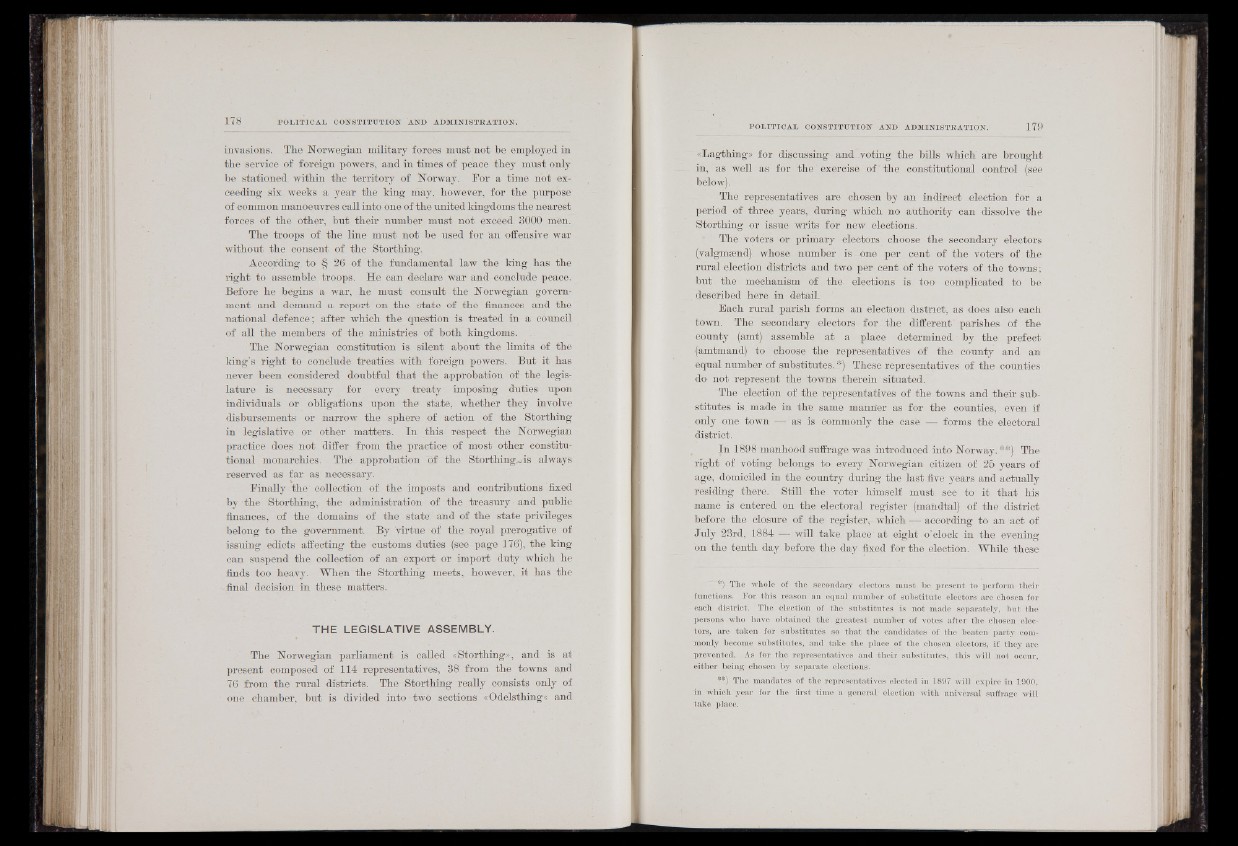
invasions. The Norwegian military forces must not be employed in
the service of foreign powers, and in times of peace they must only
be stationed within the territory of Norway. For a time not exceeding
six. weeks a year the king may, however, for the purpose
of common manoeuvres call into one of the united kingdoms the nearest
forces of the other, but their number must not exceed. 3000 men.
The troops of the line must not be used for an offensive war
without the consent of the Storthing.
According to § 26 of the fundamental law the king has the
right to assemble troops. He can declare war and conclude peace.
Before he begins a war, he must consult the Norwegian government
and demand a report on the state of the finances and the
national defence; after which the question is treated in a council
of all the members of the ministries of both kingdoms.
The Norwegian constitution is silent about the limits of the
king’s right to conclude treaties with foreign powers. But it has
never been considered doubtful that the approbation of the legislature
is necessary for every treaty imposing duties upon
individuals or obligations upon the state, whether they involve
disbursements or narrow the sphere of action of the Storthing
in legislative or other matters. In this respect the Norwegian
practice does not differ from the practice of most other constitutional
monarchies. Thé approbation of the Storthings is always
reserved as far as necessary.
Finally the collection of the imposts and contributions fixed
by the Storthing, the administration of the treasury and public
finances, of the domains of the state and of the state privileges
belong to the government. By virtue of the royal prerogative of
issuing edicts affecting the customs, duties (see page 176), the king
can suspend the collection of an export or import duty which he
finds too heavy. When the Storthing meets, however, it has the
final decision in these matters.
THE LEGISLATIVE ASSEMBLY.
The Norwegian parliament is called «Storthing», and is at
present composed of 114 representatives, 38 from the towns and
76 from the rural districts. The Storthing really consists only of
one chamber, but is divided into -two sections «Odelsthing« and
«Lagthing» for discussing and voting the bills which are brought
in, as well as for the exercise of "the constitutional Control (see
below).
The representatives are chosen by an indirect election for a
period of three years, during which no authority can dissolve the
Storthing or issue writs for new elections.
The voters or primary electors choose the secondary electors
(valgmænd) whose number is one per cent of the voters of the
rural election districts and two per cent of the voters of the towns ;
but the mechanism of the. elections is too complicated to be
described here in detail.
Each rural parish forms an election district, as does also each
town. The secondary electors for:the different' parishes of the
county (amt) assemble at a place determined by the prefect
(amtmand) to choose the representatives of the county and an
equal number of substitutes. *) These representatives of the counties
do not represent the towns therein situated.
“The election of the representatives of the towns and their substitutes
is made in the same manner as for thé counties, even if
only one town as is commonly the cas'ei'iH forms thè electoral
district.
In 1898 manhood suffrage was introduced into Norway.**) The
right of voting belongs to every Norwegian citizen of 25 years of
age, domiciled in the country during the last five years and actually
residing there. Still: the voter himself must see' to it that his
name is entered on the electoral register (mandtal) of the district
before the closure of the register, which — according to an act of
July 23rd, 1884 -S will take place at eight o’clock in the evening
on the tenth day before the day fixed for the election. While these
*) The whole of the secondary electors must, he present to perforin their
functions. For this reason an equal number of substitute electors are chosen for
each district. The election, of the substitutes is not made separately, but the
persons who have obtained the greatest number of votes after the chosen electors,
are taken for substitutes so th a t the candidates, of the beaten party commonly
become substitutes, and take the place of the chosen electors, if they are
prevented.. As for the representatives and their substitutes, this will not occur,
either being chosen by separate elections.
•?) The mandates of the representatives elected in 1897 will expiré in 1900,
in which year for the first time a general election with universal suffrage Will
take place.